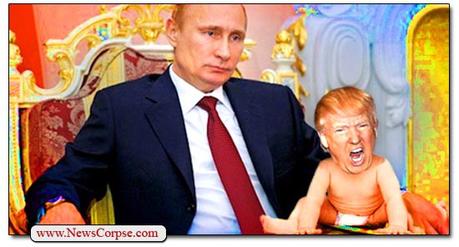
Republican presidential candidate Donald Trump likes to present himself as a strong leader. He has even compared himself to Russia's Vladimir Putin. But his repeated praise for Putin makes it look like he is more of a puppet for Putin than a strong leader for America. Here is how the editorial board of The Washington Post puts it:
ON FRIDAY, while much of the country was preoccupied with the latest revelations about Donald Trump, the U.S. intelligence community made an alarming and unprecedented announcement: Russia was seeking “to interfere with the U.S. election process” through the hacking of political organizations and individuals, including the Democratic National Committee. The statement rightly alarmed Democratic nominee Hillary Clinton, who said in Sunday night’s debate that “we have never in the history of our country been in a situation where an adversary, a foreign power, is working so hard to influence the outcome of the election.” And Mr. Trump? Once again, the GOP nominee played the part of Vladimir Putin’s lawyer. “She doesn’t know if it’s the Russians doing the hacking,” he said of Ms. Clinton. “Maybe there is no hacking.” Mr. Trump is receiving classified intelligence briefings, so he is certainly aware of the evidence that hackers backed by Moscow have stolen email and other records from the DNC and tried to penetrate state electoral systems. So why does he deny it? Mr. Trump’s advocacy on behalf of an aggressive U.S. rival, and the opaqueness of his motivation, is one of the most troubling aspects of his thoroughly toxic campaign. Experts differ on whether the Putin regime is trying to tip the election to Mr. Trump, as Ms. Clinton suggested, or merely to sow confusion and distrust about the integrity of U.S. democracy. But the leaks traced to Russia through the WikiLeaks website have been aimed at Ms. Clinton — most recently emails from her campaign chairman revealing excerpts from her private speeches on Wall Street. The timing of the WikiLeaks releases, clearly calculated to do maximum damage to the Democrats, confirms (again) that the website is not a crusader for transparency, but a willing political agent of the Kremlin. Perhaps Mr. Trump knows nothing about all this, as he protested. But he has defended Mr. Putin and his crimes throughout his campaign. He brushed off the fact that journalists and other opponents of the Russian ruler have been murdered and claimed Russia had not invaded Ukraine. He has repeatedly called Mr. Putin a better leader than President Obama. In Sunday’s debate, Mr. Trump reeled off a series of false statements about Russia’s intervention in Syria, saying it was aimed at the Islamic State even though almost all of Russia’s bombs have fallen on rebel groups fighting the regime of Bashar al-Assad, or on civilians. He then rejected the statement by running mate Mike Pence that “provocations by Russia need to be met with American strength” and the United States should consider using “military force to strike military targets of the Assad regime” if Russia’s bombing of Aleppo continued. (Abjectly, Mr. Pence on Monday attempted to deny that he said those words in the vice-presidential debate.) “I think it would be great if we got along with Russia because we could fight ISIS together,” Mr. Trump said at Sunday’s debate. Here’s what we don’t know: Does Mr. Trump propose this collaboration with a regime obsessed with thwarting and weakening American power out of ignorance and naivete, or because of personal and business interests he has not disclosed? Mr. Putin surely knows the answer to that question — but U.S. voters do not.

